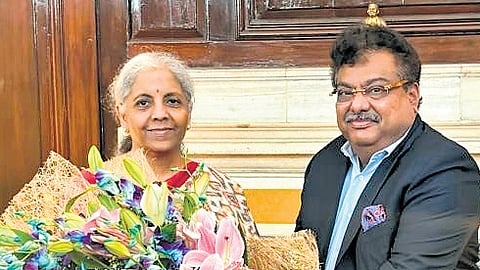Minister MB Patil meets Rajnath, proposes establishment of defence corridors in Karnataka
BENGALURU: Industries Minister MB Patil on Tuesday held meetings with Union ministers in New Delhi and sought their support to address key issues related to Karnataka. During his meeting with Defence Minister Rajnath Singh, Patil proposed establishment of defence corridors in Karnataka, capitalising on its aerospace and defence ecosystem.
Raising key issues affecting Karnataka’s aerospace and defence sectors, Patil stressed the need to ease the restrictions on simultaneous domestic production and export by defence companies. He sought to promote and encourage investments by Central Public Sector Units (CPSUs) in Karnataka. He also sought support for development of Karwar Naval Air Station, especially for extending the runway from 2,000 metres to 2,700 metres, according to a statement issued by Patil’s office.
During his meeting with Union Minister for Steel and Heavy Industries HD Kumaraswamy, Patil highlighted the challenges faced by startups in the EV sector in meeting the Rs 10,000-crore revenue threshold under the PLI Auto Scheme and the delay in implementing the FAME 3 Scheme, which is affecting EV adoption momentum, the statement said.
Patil emphasised the need for expansion of CPSUs such as BHEL and BEML, and establishing defence technology hubs in Karnataka. He sought speedy approval for the EMC cluster in Bengaluru Rural district, environmental clearances for projects at Harohalli, Kudithini, and Devakathikoppa. Patil also referred to the delay in the development of the Multi-Modal Logistics Park, the release said. Seeking support to establish a semiconductor company in Karnataka, Patil urged Kumaraswamy to help bring Karnataka under the National Industrial Corridor Development Programme (NICDP) for new smart city projects.
During his meeting with Finance Minister Nirmala Sitharaman, Patil stressed the need to revoke GST on airfreight to alleviate the burden on small exporters, particularly those dealing with perishable goods, thereby enhancing their global competitiveness.
Patil emphasised the need for rationalisation of high import tariffs and customs duties on electronic products to reduce the cost disadvantage for Indian exporters and bolster the electronics manufacturing sector’s global competitiveness.

